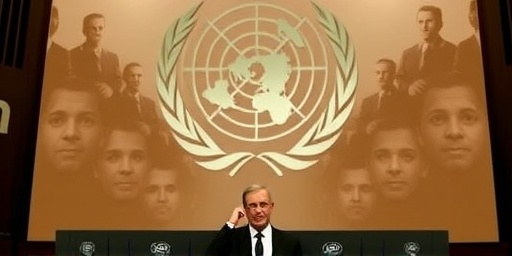In a dramatic showdown at the ongoing UN climate talks in Baku, Azerbaijan, representatives from dozens of nations and leading environmental organizations unleashed sharp criticism against the draft proposals, labeling them woefully inadequate in the face of accelerating climate change. Small island states, vulnerable to rising seas, joined forces with European powers and advocacy groups like Greenpeace to demand bolder commitments, warning that the current trajectory risks catastrophic global warming beyond the 1.5-degree Celsius threshold agreed upon in Paris over a decade ago.
The uproar unfolded on the third day of the Conference of the Parties (COP29), where delegates from nearly 200 countries are hashing out environmental policy amid record-breaking heatwaves, floods, and wildfires that have plagued 2024. Activists outside the venue chanted slogans like “No Planet B,” while inside, negotiators clashed over funding for adaptation in developing nations and timelines for phasing out fossil fuels. This backlash highlights deepening fractures in international negotiations, as the world grapples with emissions that continue to climb despite years of summits.
“These proposals are a betrayal of the most vulnerable,” declared Al Jazeera Al Suwaidi, a delegate from the Pacific island nation of Tuvalu, whose homeland faces existential threats from sea-level rise. “We need action now, not empty promises that keep us on a path to 2.5 degrees of warming.” Her words echoed sentiments from a coalition of 40 least-developed countries, who argued that the drafts fail to deliver the trillions in climate finance promised at previous COPs.
Vulnerable Islands and Developing Nations Frontline the Criticism
At the heart of the discontent are small island developing states (SIDS) and African nations, whose representatives have positioned themselves as the moral compass of the UN climate talks. These countries, contributing minimally to global greenhouse gas emissions yet suffering disproportionately from climate change impacts, slammed the proposals for lacking enforceable targets on emission reductions. For instance, the Alliance of Small Island States (AOSIS) issued a joint statement accusing major emitters like China and the United States of diluting language on fossil fuel transitions.
Statistics underscore their plight: According to the Intergovernmental Panel on Climate Change (IPCC), sea levels have risen 20 centimeters since 1900, with projections indicating up to one meter by 2100 if warming exceeds 2 degrees. In 2024 alone, Cyclone Idai’s remnants devastated parts of Mozambique, displacing over 100,000 people, while droughts in the Horn of Africa pushed millions toward famine. “Our voices are drowning out not just from floods, but from the indifference of wealthier nations,” said Patricia Scotland, Secretary-General of the Commonwealth, representing many SIDS.
Delegates from Brazil and India, while supportive of stronger environmental policy, expressed frustration over the inequity in international negotiations. Brazil’s Environment Minister Marina Silva highlighted how the proposals sideline indigenous knowledge in deforestation pledges, despite the Amazon’s role as a critical carbon sink. “Climate change is not abstract; it’s erasing cultures and ecosystems,” she stated during a plenary session. These nations pushed for a “loss and damage” fund to be operationalized immediately, with contributions from high-income countries scaling up to $100 billion annually—a figure far short of the $400 billion experts say is needed.
The tension peaked when a group of African Union members walked out of a subcommittee meeting, protesting the slow pace on adaptation funding. This isn’t mere posturing; it’s a reflection of real-world crises, where climate-induced migration could displace 1.2 billion people by 2050, per World Bank estimates. In the corridors of the Baku Expo Center, whispers of potential alliance shifts circulated, with some developing nations considering aligning more closely with China to counterbalance Western hesitancy.
Environmental Groups Amplify Calls for Ambitious Reforms
Environmental organizations have turned up the heat at COP29, transforming the UN climate talks into a battleground for radical change. Greenpeace, WWF, and Friends of the Earth led a coalition of over 100 NGOs in a scathing open letter, describing the draft texts as “a roadmap to climate catastrophe.” Their critique focuses on the vagueness of Nationally Determined Contributions (NDCs), which countries are expected to update, but which currently project a 2.5-2.9 degree warming scenario if unchanged.
“The proposals are too weak to match the urgency of the crisis,” asserted Jennifer Morgan, Executive Director of Greenpeace International, in an exclusive interview. “We’re seeing biodiversity collapse, with one million species at risk of extinction due to climate change, as per the IPPO report. Yet here we are, debating loopholes for oil and gas.” The groups organized a “Red Line for 1.5” protest, where activists dressed in red formed a human chain around the venue, symbolizing the non-negotiable limit for global temperature rise.
WWF’s analysis, released mid-summit, revealed that current environmental policy commitments would leave 70% of the world’s coral reefs extinct by 2050, exacerbating food insecurity for billions reliant on fisheries. They urged for binding timelines on renewable energy transitions, pointing to successes like the EU’s Green Deal, which aims for net-zero by 2050 but needs global replication. “International negotiations must evolve beyond rhetoric,” said Marco Lambertini, WWF’s Director General. “Phasing out coal by 2030 in OECD countries isn’t optional; it’s essential.”
Youth activists, amplified by figures like Greta Thunberg, who addressed a side event virtually, criticized the intergenerational injustice. Thunberg called the talks “greenwashing at its finest,” noting that fossil fuel subsidies reached $7 trillion in 2022, per IMF data—more than global health spending. These groups have leveraged social media, with #COPFail trending worldwide, pressuring delegates and garnering millions of signatures for a petition demanding stronger language on methane reductions, a potent greenhouse gas from agriculture and leaks.
In a bold move, 350.org launched a divestment campaign targeting banks funding COP-host Azerbaijan, a major oil producer. This tactic underscores the intersection of environmental policy and economic interests, as the summit’s oil-rich setting has drawn accusations of conflict of interest. Overall, these organizations are not just criticizing; they’re proposing alternatives, like a global carbon tax to fund just transitions in vulnerable economies.
Major Economies Grapple with Emission Targets and Finance Gaps
While the UN climate talks rage on, major economies find themselves at a crossroads, torn between economic realities and the imperatives of climate change. The European Union, led by Germany’s Environment Minister Steffi Lemke, praised some progress on renewable targets but condemned the lack of ambition in trade-related emissions. “We cannot afford half-measures when extreme weather events cost Europe €150 billion last year alone,” Lemke remarked, citing floods in Germany that claimed nearly 200 lives.
The United States, under the Biden administration, faces internal pushback but has pledged to triple its NDC ambition. However, critics like the Sierra Club argue it’s insufficient without Senate ratification of the Paris Agreement’s full scope. China, the world’s largest emitter, countered by highlighting its renewable investments—over 50% of global solar capacity—but resisted caps on coal, essential for its industrial base. “Developing nations need space to grow sustainably,” said Xie Zhenhua, China’s climate envoy.
A pivotal flashpoint is climate finance, where pledges from COP27’s $100 billion goal remain unfulfilled; only $83.3 billion was mobilized in 2022, mostly loans rather than grants. Developing countries demand $1 trillion annually, with mechanisms like a 2% levy on maritime fossil fuel transport proposed by Barbados. Statistics from the UN Framework Convention on Climate Change (UNFCCC) show that adaptation needs in low-income countries could reach $300 billion by 2030, yet funding pipelines are dry.
International negotiations have seen late-night haggling, with G77+China bloc holding firm against dilution. A leaked draft revealed watered-down language on “unabated” fossil fuels, allowing carbon capture tech as a loophole—a move decried by the Fossil Fuel Non-Proliferation Treaty Initiative. Experts like those from the Climate Action Tracker warn that without stronger commitments, global emissions could peak only in 2025, missing the 43% cut needed by 2030 for 1.5 degrees.
Side deals offer glimmers of hope: A new biodiversity-climate nexus agreement between Brazil and the UK aims to protect 30% of oceans by 2030, integrating environmental policy with conservation. Yet, overarching tensions persist, as Russia’s war in Ukraine has spiked energy prices, complicating emission pledges.
Path Forward: Urging Swift Action in Final COP Rounds
As COP29 barrels toward its close, the path forward hinges on bridging divides in these UN climate talks. Delegates are racing to refine texts, with high-level ministerial segments scheduled to inject urgency into international negotiations. Success could mean a robust finance framework and enhanced transparency in NDCs, potentially averting the worst of climate change ravages.
Looking ahead, the outcomes will ripple into 2025’s national strategies, influencing everything from urban planning to agricultural reforms. Environmental groups vow continued pressure, planning global strikes if ambitions falter. Nations like those in the Caribbean Community (CARICOM) are preparing legal challenges at the International Court of Justice, seeking accountability for historical emissions.
Optimism flickers from breakthroughs like the just-announced Global Methane Pledge expansion, now covering 150 countries aiming for 30% cuts by 2030. Yet, the stakes are existential: IPCC models predict that every 0.1-degree rise amplifies risks, from intensified hurricanes to crop failures feeding 800 million undernourished people. The world watches Baku closely, knowing that stronger environmental policy here could redefine humanity’s relationship with the planet.
In the words of UN Secretary-General António Guterres, who addressed the assembly: “We are on a highway to climate hell with our foot on the accelerator. It’s time to slam the brakes.” The final days will test whether nations heed this call, forging a legacy of action or one of regret.








